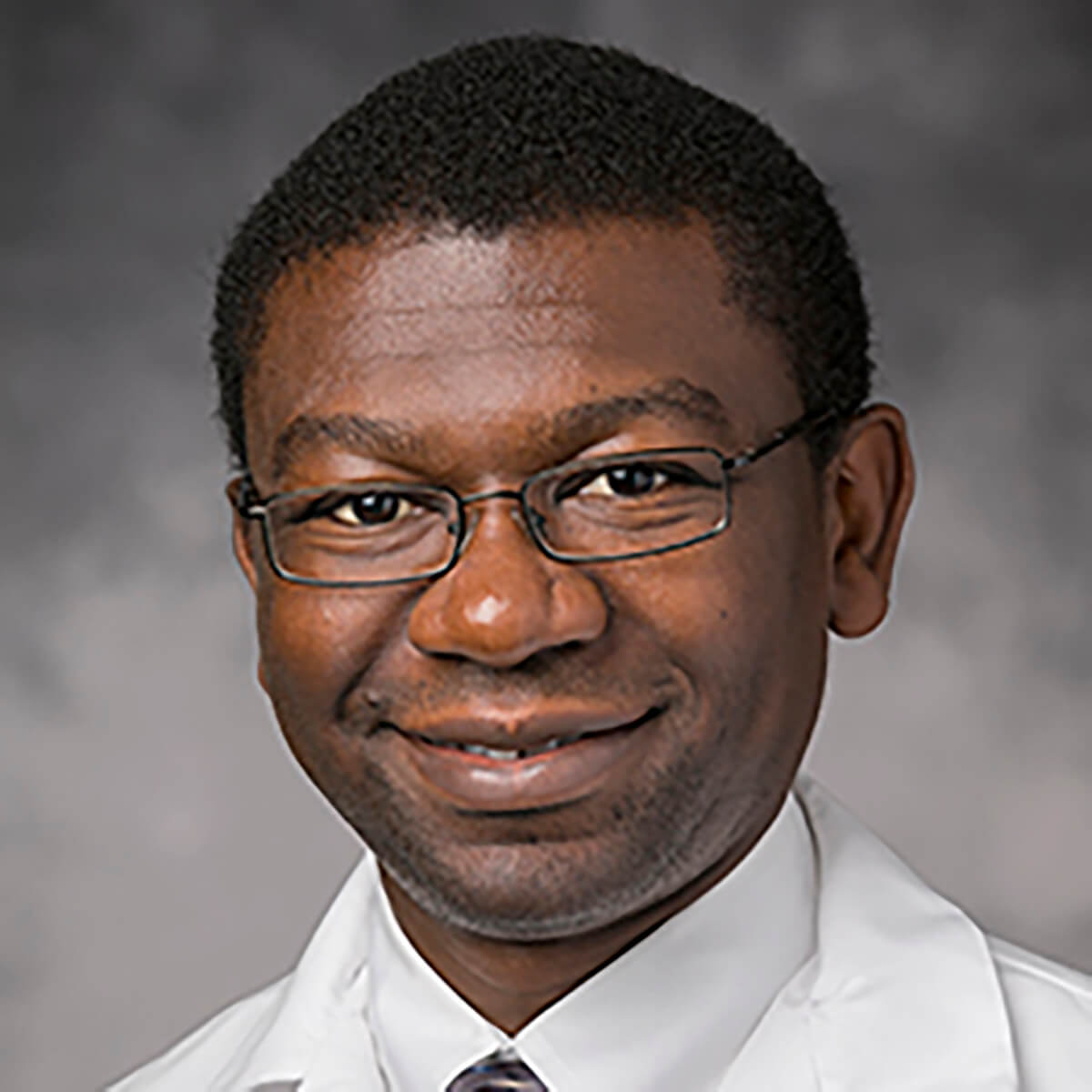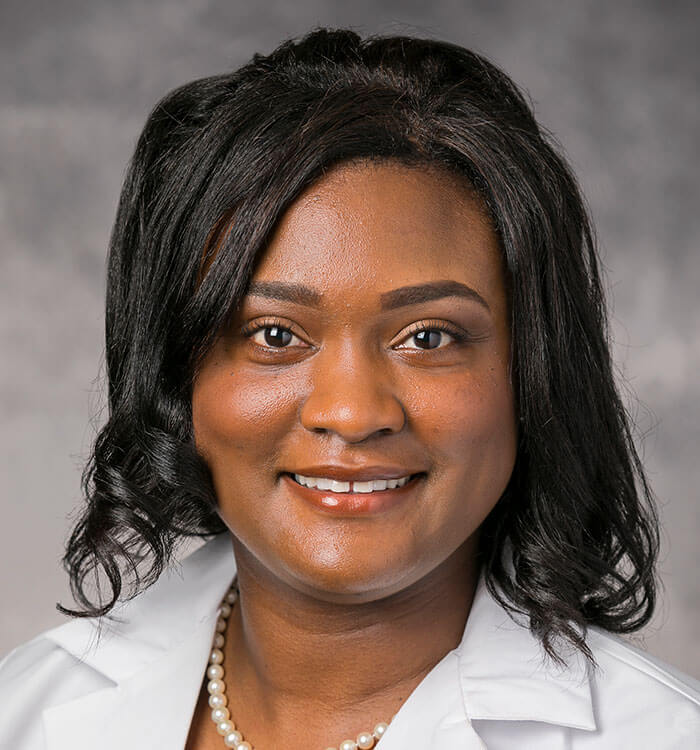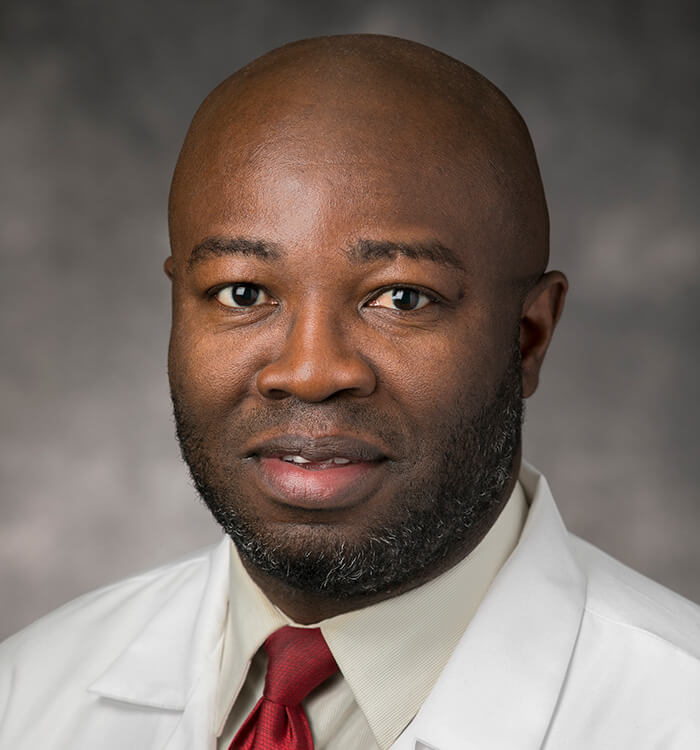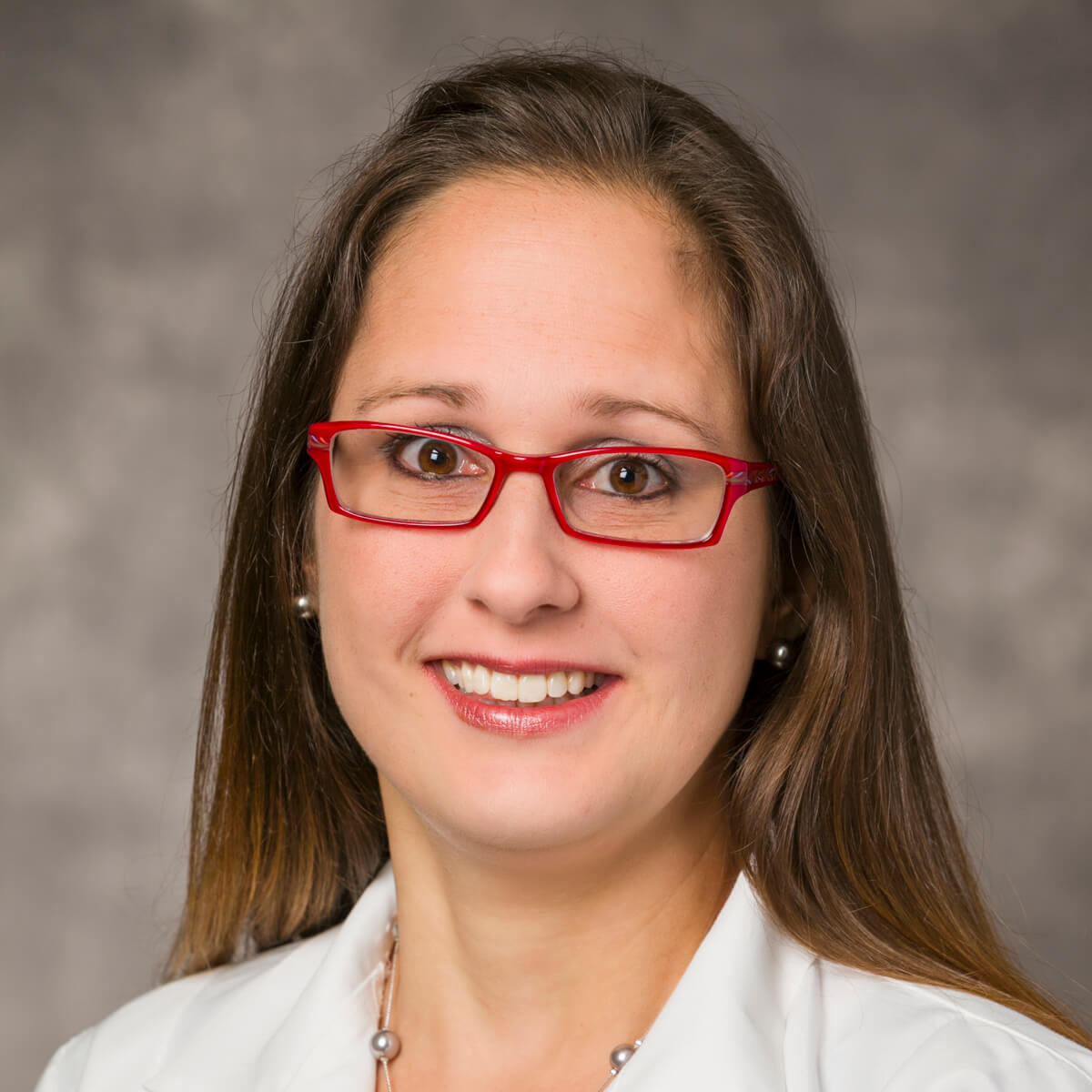Impacting Early-Career Underrepresented Minority Faculty through Institutional Funding Support
August 02, 2022
UH Research & Education Update | August 2022
Established in 2018, the UH Minority Faculty Career Development Award provides research funding to early-career faculty underrepresented in the field of medicine (URiM) working to develop an independent research projects. Sponsored by the UH Research & Education Institute (UH R&E) and the Office of Community Impact, Equity, Diversity and Inclusion (CEDI), this award aims to support URiM investigators who are early in their careers with an opportunity for career advancement. Since the inception of this award, nine award recipients including this year’s awardees, Abidemi Adegbola, MD and Dr. Shearwood McClelland, MD, are our newsletter’s “Scientists in the Spotlight.”
We asked the awardees to share how receiving this award has transformed their careers and what advice they would give to future applicants and young researchers.
Danette Conklin, PhD (2018 | Psychiatry)
 Danette Conklin, PhD
Danette Conklin, PhDProject Title: Cross-Cultural Cognitive Behavioral Group Therapy: Evaluating the effectiveness of a manualized cognitive behavior group therapy treatment for the management of menopause symptoms in a mood and anxiety disorder population
Mentors such as Martha Sajatovic, MD, and Joseph Calabrese, MD, helped to shape my research career, which has focused primarily on exploring advanced treatment protocols for menopausal women with mood disorders. This award provided opportunity to identify and define gaps in non-pharmacological treatment protocols for menopausal women, particularly in the subspecialty area of menopausal women diagnosed with Bipolar Disease or MDD. Discovering the challenges of this subspecialty population in menopausal care has motivated me to continue research in this area and to modify existing treatment manuals to meet this subspecialty’s specialized treatment needs. Most recently, I have initiated a collaborative research project to investigate health disparities in menopausal care, such as women who do and do not receive hormone therapy.
Additionally, the receipt of this award created various opportunities including:
- Meeting with esteemed researchers at other universities and from other countries.
- Presenting abstract presentations regionally at the North American Menopause Society Annual Conferences and oral presentations internationally, such as at the European Menopause and Andropause Society in Berlin, Germany.
- Publishing in peer-reviewed journals with most recent study to be submitted by the end of July 2022.
- Expanding behavioral health treatment options to this subspecialty population, providing integrative healthcare to patients in the Department of Obstetrics and Gynecology through collaboration with several wonderful colleagues to improve patient care.
- Training psychiatry residents and a medical student from Case Western Reserve University about the research project, which led to both psychiatry residents and a CWRU medical student being co-authors on peer-reviewed publications.
My advice for future applicants is to learn from seasoned mentors, change the trajectory of and focus of your career, seek opportunities for regional and international presence, publish in peer-reviewed journals, improve your research and clinical skills, strengthen working relationships inside and outside of your department, and most importantly for healthcare providers, to improve treatments for the patients they serve.
Kwadwo Oduro, MD, PhD (2019 | Pathology)
 Kwadwo Oduro, MD, PhD
Kwadwo Oduro, MD, PhDProject Title: High Sensitivity Next Generation Sequencing Based FLT3-ITD Assay for Detecting Morphologically Inconspicuous Disease in AML
The last three years have been a trying time both personally and professionally but knowing I am a beneficiary of the minority award provided a modicum of psychological relief during tumultuous times while at the same time giving me the incentive to continue thinking about and working towards my career goals despite challenges. I have published on a rare deleterious mutation that causes germline predisposition, presented work at National Meetings on accessible immunohistochemistry-based methods to identify a difficult-to-classify type of acute lymphoblastic leukemia and will soon (re)submit a manuscript on a highly sensitive molecular method to detect very low-level residual disease in acute myeloid leukemia.
There is a saying that you lose 100% of the races you don’t start. I would tell future early-career faculty to actively pursuing this application within the first three years of starting at UH. The active commitment is important because it is very easy for that goal to be subconsciously deprioritized by other critical things we do for patient care and associated responsibilities here at UH. Secondly, devote the time and intellectual rigor toward developing well-thought-out research question(s) and plan(s). This may enhance your chances of winning the award and serve as a “blueprint” you can keep returning to as you keep being pulled away to accomplish your other tasks. Thirdly, it is important for young researchers to realize that research is more than ideas; resources are needed to bring those ideas to fruition (which the award helps with). Research progress also requires the proper infrastructure, personnel and time. Don’t hesitate to seek guidance from mentors within and outside your department but also endeavor to be resourceful because sometimes you might be the first person doing something or at least the first person doing it in this institution. Finally, even though an “award” naturally connotes something received, it is essential for future applicants and young researchers to also think about what they are giving back.
I have taken a lot of pride and fulfilment in the knowledge, skills and enthusiasm for hematopathology I have poured into my trainees. I navigated the complicated logistics of getting certain tests performed, which I now pass on to my colleagues. I witnessed how the knowledge and experience gained from my research have positively influenced clinical discussions and optimizing our diagnostic protocols. By giving back, future applicants, and all, would realize that the Minority Faculty Development Award has a multiplicative positive impact on the entire UH ecosystem.
Khendi White Solaru, MD (2019 |Medicine)
 Khendi White Solaru, MD
Khendi White Solaru, MDProject Title: HyPe The Cure (Hypertension and Peripheral artery disease Treatment in Cleveland Barbershops): A Pilot Study
Project Summary: Dr. Khendi White Solaru’s project hypothesis is that an enhanced intervention consisting of clinic visits for initiation of guideline-based medical therapy, smoking cessation counseling, diabetes control, as well as educational sessions and focus groups on vascular disease occurring at the barbershop will result in an improvement in baseline BP, higher PAD awareness, lower cholesterol levels, improved quality of life, better diabetes control, and increased medication adherence as compared to a usual care control in high-risk population of Africa American men with PAD and/or HTN between the ages of 40 and 90.
Tiffany Hodges, MD (2020 | Neurosurgery)
 Tiffany Hodges, MD
Tiffany Hodges, MDProject Title: Outcomes and patterns of care for patients with primary malignant and nonmalignant brain tumors
As an Assistant Professor of Neurosurgery at University Hospitals Cleveland Medical Center, I am honored to have received the Minority Faculty Career Development Award. This award has allowed me to further explore my research interests in the epidemiology of primary brain malignancies and metastatic brain tumors, evaluating the clinical, genetic and metabolic profile of these cancer patients utilizing the National Cancer Center Database. In light of the papers published during this grant year and some of the findings, we discovered that there are disparities and opportunities for education when it comes to access to care for patients with brain tumors, especially historically marginalized populations. In addition, this grant has helped to fund a project evaluating brain metastases of patients with gynecological primary cancer, the results of which have been presented at the National Comprehensive Cancer Network meeting this year. Future directions for this project involve exploring metastatic brain tumors in gynecological cancers in women, which overall historically has been a rare entity. However, as patients are living longer with their disease, we are seeing more patients with brain metastasis from ovarian, uterine, and fallopian primary cancers. The goal of future studies is to understand which mutations from malignancies may increase the likelihood of disseminated disease, which factors contribute to patients developing parenchymal versus leptomeningeal disease in advanced cancer, and in turn develop a better understanding of management strategies. Having the administrative, research and clinical support provided by this grant highlights UH’s commitment to supporting faculty of diverse backgrounds with research interests.
My advice to future applicants and young researchers is to reach out to mentors and colleagues to find ways to collaborate and share ideas. Taking care of patients and advancing knowledge to improve patient outcomes do not exist in a vacuum. This award provides a great foundation for pursuing research interests and promoting faculty development, and I would strongly encourage anyone interested to apply.
Elizabeth Harris, PhD (2020 |Psychiatry)
 Elizabeth Harris, PhD
Elizabeth Harris, PhDProject Title: Addressing Healthcare Inequity through an Integrated Care Model in Pediatric Medical Settings
Receiving this award has had a significant impact on my career. It has positioned me to place focus on research activities that inform our clinical interventions, how we develop programs and how we educate psychologists in training. It has been my goal to improve mental health treatment outcomes in ethnic minority youth, and this grant has allowed me to steer my practice and the practice of others in that direction. The Minority Faculty Career Development Award also allowed me access to the mentorship of some of the best researchers and clinicians in the system.
My advice to youth researchers would be to reach out to experienced researchers and learn as much as possible while believing that you can reach similar achievements.
George Yendewa, MD, MPH (2021 | Medicine)
 George Yendewa, MD
George Yendewa, MDProject Title: Impact of HIV on Hepatitis B Clinical Outcomes in a Hyperendemic Setting in Sierra Leone
Project Summary: The central hypothesis of Dr. Yendewa’s project is that in HBV-hyperendemic settings such as Sierra Leone, HIV/HBV co-infection is a major driver of liver disease progression and clinical outcomes. Two specific aims are proposed to test the hypothesis A) Perform a cross-sectional study of newly diagnosed HBV mono- and HIV/HBV co-infected adults aged ≥ 18 years in Sierra Leone to assess the prevalence of markers of HBV and cirrhosis using non-invasive methods B) Perform a cross-sectional study to characterize HBV genotypes in Sierra Leone
Maricruz Crespo, MD (2021 |Pediatrics):
 Maricruz Crespo, MD
Maricruz Crespo, MDProject Title: Care of pediatric patients with non-alcoholic fatty liver disease (NAFLD)
Project Summary: Dr. Crespo’s research project is about obesity and its associated complications, especially Non-Alcoholic Fatty Liver Disease (NAFLD). She is interested to investigate the disparities in access of care in the pediatric population with obesity between minority groups as well as the disparities in diagnosis and treatment of NAFLD in the pediatric obese population between minority groups.
Shearwood McClelland III, MD (2022 | Radiation Oncology)
 Shearwood McClelland III, MD
Shearwood McClelland III, MDProject Title: Navigator-Assisted Hypofractionation (NAVAH) to Address Radiation Therapy Access Disparities Facing African-Americans with Breast Cancer
Project Summary: Dr. McClelland’s project will use established survey-based methods to assess barriers facing African-American breast cancer patient access to patient navigation. It will assess the use of patient navigation to increase access to radiation oncology care and utilization of standard of care radiation therapy (RT) in African-American breast cancer patients. The project will objectively evaluate whether short-course RT reduces financial toxicity compared to standard fraction RT for breast cancer in African-American patients.
Abidemi Adegbola, MD (2022 | Psychiatry)
 Abidemi Adegbola, MD
Abidemi Adegbola, MDProject Title: Molecular Mechanisms of Monogenic Attention Deficit Disorder (ADHD)
Project Summary: Dr. Adegbola’s project hypothesis is that the neuron-specific δ-catenin protein is the linchpin of a key pathway that regulates neural progenitor cell proliferation and differentiation during brain organization, resulting in normal cognition, while dysregulation results in attentional deficit. This project aims to determine the cell growth and differentiation dynamics and the major disrupted pathways/processes in delta-catenin mutant stem cell models of early brain development.
Tags: Research


